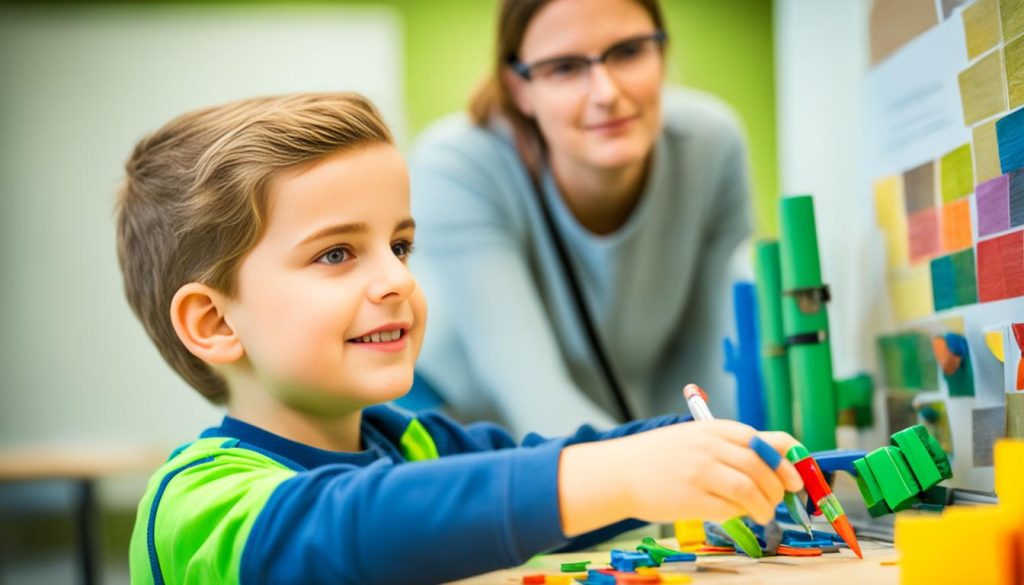Have you ever seen your child feel proud after finishing a task by themselves? It’s a moment that shows more than just the achievement. It shows their journey, struggles, and the push they made to get there. I recall my childhood when my parents gave me small chores and praised my efforts, not just the outcome. This taught me the value of hard work and boosted my confidence.
In April, Kids Village launched an initiative to teach kids about hard work and determination. Kids at Kids Village get colorful wristbands when they master a monthly value, showing how it applies in real life. This shows how important it is to teach kids about responsibility and determination. When parents talk about their own hard work, it helps kids see the value of keeping at it.
Financial expert Dave Ramsey and his daughter Rachel Cruze talk about the importance of hard work in their book “Smart Money Smart Kids.” They share how hard work has brought them closer and taught their kids the pride of a job well done. They say knowing how money relates to effort helps kids understand money and plan for the future, as seen in various parenting resources.
Teaching kids about hard work does more than prepare them for the future. It helps them feel good about themselves and their emotional health. Parenting is all about finding balance and being consistent.
Key Takeaways
- Teaching children the value of hard work can significantly impact their future capabilities and confidence.
- Positive reinforcement, such as praise and rewards, helps children understand the benefits of effort.
- Structured approaches, like those at Kids Village, integrate valuable life lessons into daily activities.
- Sharing personal stories about hard work can inspire children to strive for their goals.
- Setting clear and realistic expectations can effectively instill a strong work ethic in children.
The Importance of Teaching Kids Hard Work
Teaching kids about hard work is key for their growth and getting ready for challenges ahead. A 2014 Pew study found 92% of parents think it’s vital to teach kids hard work. By teaching them early, you boost their emotional intelligence in children, child social skills development, and building self-esteem in children.
Many leaders worry about today’s youth lacking discipline and a strong work ethic. That’s why teaching these values at home is vital. By setting clear rules and linking chores to rewards, you teach them about effort and its rewards.

Start by getting your kids involved in simple tasks like cleaning up or helping with chores. This teaches them about finishing what they start. It also makes them feel good about what they’ve done, helping to build self-esteem in children.
Changing how you talk about chores from “have to” to “get to” makes them fun. This makes parenting better and helps kids enjoy their tasks. Being part of sports or clubs teaches them that hard work and sticking with it are key to success.
Here are some ways to teach kids the value of hard work:
- Involve children in daily chores to build responsibility.
- Encourage participation in activities like sports or scouting.
- Set clear expectations and link privileges to completed chores.
- Promote the idea that effort and persistence lead to success over time.
- Limit time spent on video games to prevent addiction and laziness.
Studies show that kids doing structured activities do better than those just playing all day. A study found that kids praised for their hard work try harder than those praised for being smart. This shows how important it is to focus on effort and not just intelligence.
Here’s a look at how different parenting methods affect kids:
| Approach | Outcome | Effect on Child |
|---|---|---|
| Involvement in Chores | Higher Responsibility | Enhanced emotional intelligence in children |
| Participation in Sports | Improved Persistence | Stronger child social skills development |
| Limiting Video Games | Reduced Laziness | Better Focus and Discipline |
| Praise for Effort | Boosted Motivation | Increased Confidence and self-esteem |
Using these strategies with your child can greatly help them grow. It teaches them to work hard and prepares them for the future.
Understanding the Benefits of Hard Work for Children
Hard work is key to learning important life skills. It helps children build a strong base for learning throughout their lives. When kids do tasks like managing screen time or helping with chores, they gain crucial skills. Let’s see how this helps them.

Building Self-Esteem in Children Through Hard Work
Doing tasks like cleaning their room or learning new things boosts a child’s self-esteem. Challenges help them see what they can do. Kids who finish chores or homework feel proud and learn to keep going.
For instance, 88% of kids who do chores at home feel proud of their work. This feeling of doing well is key for building confidence and a love for learning.
Developing a Strong Work Ethic in Kids
Doing tasks that take effort helps kids develop a strong work ethic. This ethic is not just for physical tasks but also for managing screen time and other duties. Research shows that 95% of parents think teaching a strong work ethic is crucial for their kids’ future success.
Tasks like cutting hay or cleaning a family member’s house teach kids about drive and careful planning. These skills are vital for success in life, just as much as good grades. Even with fewer chances for physical work today, parents can teach kids to be thankful by getting them involved in chores.
Parents can make a big difference by showing kids how hard work leads to results. The Smart Money Smart Kids survey found that kids who learn the value of hard work are 67% more likely to find good friends who also value hard work.
| Percentage | Benefit |
|---|---|
| 88% | Children experience a sense of achievement and pride in their work |
| 95% | Parents believe instilling a strong work ethic has a lasting impact on future success |
| 81% | Adults believe children should be taught the value of hard work from a young age |
| 84% | Adults agree children who learn the relationship between work and money develop financial responsibility as adults |
Strategies to Encourage a Growth Mindset in Kids
Helping kids develop a growth mindset means praising their effort, not just their achievements. It also means giving them detailed feedback and challenges that match their abilities. By focusing on effort, you show them that hard work can improve their skills. This is different from just praising easy tasks, which might make them think success comes easily.
Studies show that kids’ brains change and get better with effort. This leads to more motivation and success. When you talk positively about mistakes, you teach them that taking risks is part of learning. Knowing how emotions affect learning, like feeling stressed, can also help them learn better.

- Praise Effort: Focus on the hard work and persistence they put into a task, not just the results.
- Use Detailed Feedback: Give feedback that helps them see how they can improve and what they’re doing well.
- Provide Appropriate Challenges: Offer challenges that are right for their age to help them be resilient and adaptable.
- Model Positive Behavior: Let them see that mistakes are okay and share stories where you kept going and succeeded.
“Mindset, in other words, is an important contributor to children’s motivation and learning, affecting their resilience and achievement.” – Carol Dweck
Practicing mindfulness is also a good strategy. Techniques like Square Breathing can calm down stress and help with learning. Activities that boost creativity, like the “hard thing” rule and reflection, can also help. Encouraging positive self-talk helps them stay strong and confident.
Helping kids deal with tantrums by understanding their feelings can also support a growth mindset. Research shows that focusing on growth mindset can lead to better grades and more motivation. These methods, along with a caring environment, can greatly improve kids’ mindset and growth.
| Key Strategy | Effect |
|---|---|
| Praising Effort | Promotes growth mindset and resilience |
| Square Breathing | Helps manage stress and improve focus |
| Modeling Positive Behavior | Teaches children that making mistakes is a part of learning |
| Providing Challenges | Fosters adaptability and problem-solving skills |
Positive Reinforcement as a Tool for Effective Discipline
Positive reinforcement parenting is a strong way to guide kids towards good behavior with praise and rewards. It focuses on the effort, not just the result. This helps kids keep going when things get tough. It also helps with managing their behavior and learning self-control.

Studies by Rodriquez & Sprick say to praise more than criticize by 5 to 1 for best results. Dr. Dan Siegel suggests showing real interest in what your child likes. This makes kids feel important and heard.
Using Praise and Rewards Effectively
Praise makes kids of all ages want to act well to get approval. Descriptive praise, which points out the good action, works best. It’s a key part of teaching kids right from wrong.
At school and at home, rewards like compliments, praise in front of others, and treats work well. Home rewards can be more playtime, choosing activities, or extra screen time. Make sure the reward is clear and sticks to the good action. Being consistent helps when teaching new behaviors or skills.
Jessica Lahey’s book “The Gift of Failure” says being too protective can hurt kids’ growth. Praising and rewarding them helps them be independent and skilled. This idea matches the Self-Determination Theory by Ryan and Deci, which says positive discipline builds autonomy, skill, and connection in kids. For more on this, check out this guide.
Positive reinforcement is better than punishment for a happy home. It encourages good actions more than focusing on the bad ones. This makes it a key way to manage kids’ behavior well.
The Role of Positive Parenting in Instilling Hard Work
Positive parenting is key to teaching kids the value of hard work. It mixes love and discipline to lay a strong foundation for success. By using positive parenting, you set clear rules and support your kids emotionally. This helps them deal with sibling rivalry and grow resilient.
Studies show that positive parenting has many benefits for both parents and kids. It’s important to communicate well and set limits. This helps kids develop a strong work ethic and resilience. Encouraging them to try hard tasks and giving feedback helps them keep going.
Balancing Love and Discipline
Finding the right mix of love and discipline is key. This balance helps kids face life’s challenges bravely. Here are some tips:
- Give your child unconditional love and support to boost their confidence.
- Set clear, consistent rules for a safe and secure environment.
- Be patient and let your child try and sometimes fail at hard tasks.
- Use positive ways to guide behavior instead of punishing mistakes.
When dealing with sibling rivalry, a mix of love and discipline helps kids learn empathy and social skills. Positive parenting helps kids bounce back from tough times and stay motivated.
| Component | Description | Benefits |
|---|---|---|
| Unconditional Love | Shows acceptance and emotional support | Boosts self-esteem and builds resilience |
| Clear Boundaries | Establishes expectations and rules | Creates structure and security |
| Patience | Permits children to own their learning process | Encourages perseverance and self-reliance |
| Positive Discipline | Focuses on guiding rather than punishing | Promotes healthy behavior and problem-solving skills |
By using these methods, you make a space where kids want to work hard and succeed. Positive parenting is a powerful way to teach the value of hard work. It also helps raise a resilient and independent child.
Incorporating Family Traditions to Teach Hard Work
Family traditions and rituals are key to teaching kids about hard work. A review of 50 years of research shows they bring stability and help with school and health. These routines teach important skills, making it easier for kids to handle big changes like divorce.
They also help kids learn to respect and understand each other. This makes family life better and prepares kids for life’s ups and downs.
One way traditions teach hard work is by showing the value of teamwork. When kids help with chores or seasonal tasks, they learn about working together. This balance between work and family time teaches kids the value of hard work in a fun way.
Traditions like sharing meals and bedtime stories also have a big impact. Shared dinners, for example, make everyone happier and help kids do better in school. These activities show kids the importance of sticking together and working as a team.
To build a strong family culture, you need to be intentional and consistent. Traditions are a key part of this. Over time, your hard work will pay off as kids learn to apply these values in their daily lives.
Being part of family traditions also brings everyone closer. Families that do these things often feel more connected. Research shows that kids who know their family history are more confident and well-adjusted. This shows that getting involved in family traditions is really good for kids.
Practical Ways to Teach Kids Responsibility
Teaching kids responsibility early helps them succeed later in life. It gives them good habits from a young age. This makes them self-reliant and accountable as adults.
Assigning Age-Appropriate Chores
Assigning chores based on age is a great way to teach responsibility. Kids as young as three can start with simple tasks like cleaning dishes or making their beds. This prepares them for bigger tasks later and helps them develop good habits.
Starting chores early teaches kids to follow instructions and finish tasks. It shows them their role in the household. Giving them small tasks like setting the table helps them feel independent and dedicated.
As they get older, they can take on more complex tasks. This could be folding laundry or cleaning their rooms. This approach helps them grow into responsible adults.
Involving Kids in Daily Household Tasks
Getting kids involved in daily tasks is another way to teach them responsibility. They can help with laundry or cleaning up after playdates. These tasks teach them about keeping spaces clean and organized.
Being part of these chores shows kids the value of their efforts. Tasks like making their lunches or helping with yard work teach them about family contributions. For teens, managing their time and taking care of their vehicles prepares them for adulthood.
Studies show that kids who do chores early develop a strong work ethic. Being part of daily routines promotes responsibility and healthy habits. Giving clear instructions for each task helps them learn and feel accomplished.
Parent-Child Communication: Discussing the Value of Hard Work
Talking with your kids about hard work is key to sharing family values. It’s important to have open talks. This lets you explain the value of hard work and resilience.
Having Open Conversations About Expectations
Talking openly about what’s expected helps your kids understand their roles at home. These talks should be full of empathy and support. It’s a chance to teach them about different values and perspectives.
When you listen well, by keeping eye contact and focusing on your child, you show you care. This makes your child feel safe to share their thoughts and feelings. It also makes your bond stronger.
Sharing Personal Experiences and Stories
Telling your own stories of hard work makes the lesson more real. It shows your kids the value of resilience and hard work. Sharing your struggles and wins can inspire them to keep going.
It also helps teach them about diversity by showing how different backgrounds bring different challenges and chances. This kind of talk strengthens your bond and encourages honest conversation and respect.
| Aspect | Importance (%) |
|---|---|
| Education and Value for Hard Work | 60% |
| Independence and Decision-Making Skills | 40% |
| Emotional Connection and Open Communication | 25% |
| Influence of Upbringing and Positive Parenting | 20% |
| Avoidance of Strict Discipline | 15% |
| Religious Teachings and Good Morals | 10% |
| Opportunities for Exploration and Personal Goals | 10% |
| Avoidance of Overprotection | 5% |
| Being Present and Engaged | 5% |
| Avoidance of Societal Norms and Outdated Traditions | 5% |
Sharing your experiences and talking with your kids about what’s expected is key. It builds a strong bond and teaches them to respect and understand you. This can last a lifetime.
Leveraging Outdoor Play to Teach Effort and Persistence
Outdoor play is a great way to teach kids about effort and persistence. Activities like climbing trees, exploring nature trails, and playing sports challenge them physically and mentally. These activities help develop important skills and build resilience.
Studies show that kids who play freely with others have better self-control and self-regulation. Outdoor play is not just good for fitness. It helps kids find their interests and love the outdoors. Playing with others, with or without adults, improves learning and understanding.
Early childhood is key for setting up success in school and life. Outdoor play is crucial during this time. It helps kids develop important skills like self-regulation, focus, and patience. These skills are vital for their future.
Research worldwide points out the value of skills like socio-emotional learning, creative thinking, and physical development. Outdoor activities are a great way to help kids grow into well-rounded individuals.
FAQ
How can teaching hard work improve my child’s development milestones?
Why is it important to teach kids hard work?
How does hard work build self-esteem in children?
What strategies can help develop a strong work ethic in kids?
How can parents manage screen time to promote hard work and lifelong learning in children?
What are some effective ways to encourage a growth mindset in kids?
How does positive reinforcement help in effective discipline and managing child behavior?
How can parents balance love and discipline to instill the value of hard work?
Can family traditions help teach hard work to kids?
What are practical ways to teach kids responsibility through household tasks?
How can parent-child communication enhance the value of hard work?
How does outdoor play contribute to teaching effort and persistence to children?
This post contains affiliate links. If you click on a link and make a purchase, I may earn a small commission — at no extra cost to you. Thank you for supporting this blog and helping me keep the patterns free! Read the full Affiliate Disclosure & Transparency.
